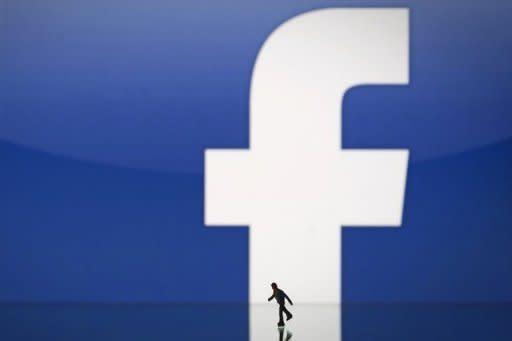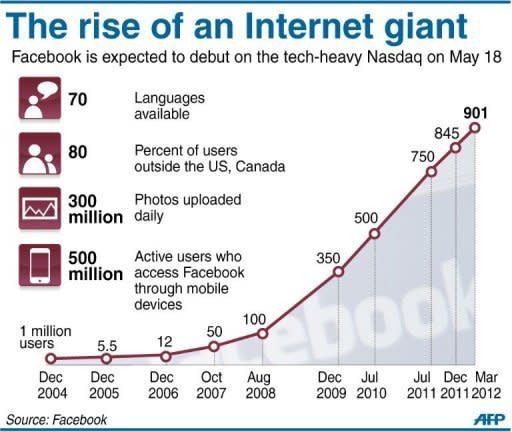Facebook boosts IPO share price amid hot demand
Amid signs of strong investor demand, Facebook on Tuesday boosted the share price estimate for its stock market debut, giving the leading social network a value that could top $100 billion. Facebook will price its initial public offering (IPO) between $34 to $38 per share, up from a range of $28 to $35, according to paperwork filed with the US Securities and Exchange Commission. The raised IPO share price reflects confidence in demand for Facebook stock and gives the Menlo Park, California-based company a value of $93-104 billion. The amended documents showed an additional 50 million shares would be offered to cover the so-called "over-allotment," or amount investment banks may issue if they perceive demand is strong. At the higher end of the price range, Facebook could raise nearly $15 billion through the stock sale, with a large chunk of the cash going to its early backers and employees compensated with stock. Facebook is already assured of becoming the most valuable US Web company at the time of an IPO, topping Google's $23 billion valuation in 2004. Trading is expected to begin on Friday under the symbol "FB" on the technology-heavy Nasdaq. Mark Zuckerberg Under a dual-class stock structure, Facebook founder and chief executive Mark Zuckerberg, 28, retains 57.3 percent of the voting power of the shares. The company is expected to reap net proceeds of $6.4 billion at $36 per share. The rest of the cash will go to other sellers and cover the costs of offering, including fees and commissions. Depending on the final value, the IPO would be one of the largest of a US firm on Wall Street, behind the 2008 offering of Visa ($17.8 billion) and General Motors in 2010 ($15.7 billion). The offering is underwritten by several banks led by Morgan Stanley, JPMorgan Chase and Goldman Sachs. Based on the estimated market value, Facebook would be in the neighborhood with Amazon ($100 billion) and Cisco ($90 billion) and ahead of Hewlett-Packard ($45 billion) and struggling Yahoo! ($19 billion). Some analysts predicted Facebook's stock price will jump quickly to $44 a share and climb much higher in the long term as Facebook finds ways to leverage its membership of 900 million. At the heart of the debate about the wisdom of owning a piece of Facebook is how much revenue it takes in. Revenue vaulted to $1.06 billion in the quarter which ended March 31 -- an improvement year-over-year, but down about six percent from the previous quarter. Eighty-five percent of the total came from ad sales. But several analysts were skeptical about whether Facebook can justify the high value. Jim Krapfel, analyst at Morningstar, said the new share price was an effort "to build momentum going into the IPO" and get a strong opening. "We definitely think that the stock will be grossly overvalued once it starts trading, so we'd definitely not recommend investors to chase the stock," he said. Michael Pachter at Wedbush Securities said he believes Facebook will benefit from the "buzz," at least in the short term. "I think that the shares will open and close above the high end of the range," he said. The IPO comes amid a wave of tech offerings with mixed success. Groupon, the online deals firm, has lost 34 percent since its November IPO while LinkedIn, a professional social network, has soared 150 percent in a year. The IPO means that Facebook, which has been under scrutiny for its privacy policies and other matters, will be subject to more oversight and regulation. In one negative for Facebook, the Wall Street Journal reported that General Motors plans to stop advertising on Facebook because it determined paid ads had little impact on consumers. The US auto giant is the third largest advertiser in the United States with expenditures of $1.8 billion in 2011, according to Kantar Media. It will continue to expand its use of unpaid marketing such as the creation and management of content on the Facebook pages of its brands and cars, the Journal reported. But according to the consultancy eMarketer, Facebook's share of overall US display ad market revenues grew to 14 percent in 2011 and will likely hit 16.8 percent this year, overtaking Google.




